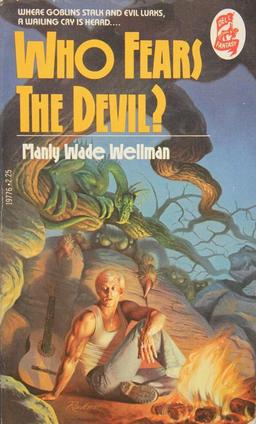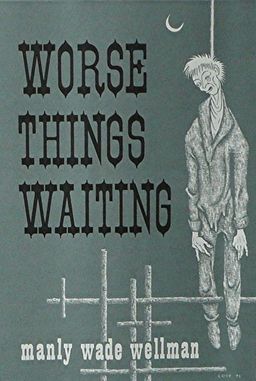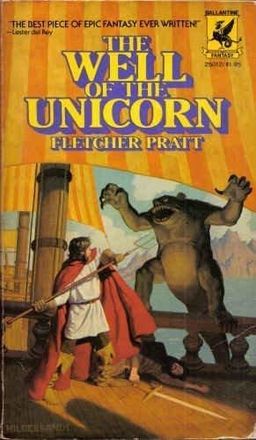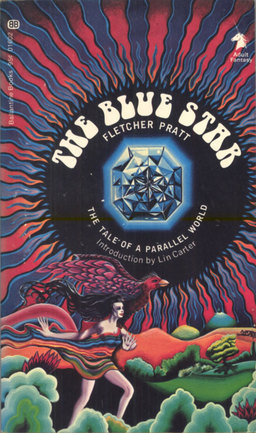Manly Wade Wellman, Fletcher Pratt, and Appendix N: Advanced Readings in D&D
 I’ve been waiting for Mordicai Knode and Tim Callahan at Tor.com to get to both Manly Wade Wellman and Fletcher Pratt as part of their ongoing exploration of Gary Gygax’s famous Appendix N — and not very patiently, either.
I’ve been waiting for Mordicai Knode and Tim Callahan at Tor.com to get to both Manly Wade Wellman and Fletcher Pratt as part of their ongoing exploration of Gary Gygax’s famous Appendix N — and not very patiently, either.
Manly Wade Wellman is consistently one of the most beloved authors we feature here at Black Gate. Just three days ago Fletcher Vredenburgh reviewed his Battle in the Dawn: The Complete Hok the Mighty, and a while back new Black Gate blogger Alex Bledsoe offered a fine reminiscence of Wellman’s Appalachian fantasy tales in “How I Discovered Silver John.” The most popular contest in our history was our call for The Best One-Sentence Reviews of Manly Wade Wellman, and the winners received a copy of Haffner Press’ gorgeous The Complete John Thunstone.
And Fletcher Pratt? He wrote The Well of the Unicorn, one of the 20th Century’s most acclaimed heroic fantasy novels (none other than Lester del Rey called it “The best piece of epic fantasy ever written.”) With his frequent collaborator L. Sprague de Camp, he was also the author of the very popular Incomplete Enchanter and Gavagan’s Bar series.
So I’ve been looking forward to both authors receiving the Appendix N treatment. And now at last the wait is over.
Sadly, Tim doesn’t seem to fully briefed on the greatness that is Manly Wade Wellman:
I didn’t know anything about Manly Wade Wellman before Mordicai and I embarked on this project. I had never heard of the author, outside of the mention of his name in Appendix N.
Ouch. Well, I’d read almost nothing by Clark Ashton Smith prior to last week (when I read his brilliant pulp horror story “The Vault of Yoh-Vombis“), so I guess we all have our blind spots.
The real question is: What does Tim think of Wellman now?
So why isn’t Manly Wade Wellman a bigger deal? His biography positions him as an almost-too-good-to-be-true pillar of fantasy and sci-fi, but he’s mostly forgotten by the general public. Why don’t we all talk about Wellman all the time, the way we talk about Tolkien or Howard or Lovecraft?
Well, I think the answer is this: while he’s a better writer, on a technical level, than either Howard or Lovecraft – Wellman has a masterful command of language and syntax, and shows a Mark Twain-esque facility with diction and vernacular, when he needs it – and while Wellman is amazingly deft mashing together the weirdness of the regional mythology with semi-cosmic horror and swashbuckling heroes, his stories just aren’t incredibly compelling. They are fascinating, and endearingly well-written… but where Tolkien has the grand heroism and Howard has the fleshy savagery and Lovecraft has the encroaching dread, Wellman has…well, he has the eye of an anthropologist and the storytelling gift of a likable teacher. It’s still kind of distant though.
 Huh. Not exactly a sterling endorsement.
Huh. Not exactly a sterling endorsement.
I still don’t know what Wellman he’s actually read, though. And there’s a lot to choose from — Night Shade published a fabulous five-volume collection of his selected fiction a decade ago, for example, and that didn’t even include any of his novels.
Well, I’m sure Tim will get to it. Ah — here it is.
I bounced from a Captain Future novel he wrote, called The Solar Invasion, to his Silver John stories collected in Who Fears the Devil, to The Complete John Thunstone. I felt like I had to read more because something was not quite working, but I couldn’t tell if it was the genre or the characters or what… Almost every John Thunstone story reads like an installment of X-Files: 1945 with Fox Mulder played by a mustachioed Joel McCrae. In each case, there’s a mystery, an investigation that mostly consists of going straight toward the mystery, and a quick climax and resolution, and then a song or a quip or a cocktail party to wrap it all up.
Well it appears the magic of Wellman is lost on Tim Callahan. A pity, but it’s a big genre, and you’re not required to like everything to qualify to be a fan.
As a brief aside, Manly Wade Wellman was perhaps the very first author I really collected (kind of a scary thought, when I think about it). It all stems from the first time I saw his Carcosa collection Worse Things Waiting in the Dealer’s room at the World Fantasy Convention in Ottawa in 1984.
I saved up my money and eventually bought a copy (for around $40, I think), and then began a very serious effort to track down the companion volume from Carcosa, Lonely Vigils. That one took me many years to finally locate at a decent price ($60, after some long haggling, if I recall correctly). Those two volumes inaugurated me into decades of rare book collecting in the fantasy genre — and they’re still two of my favorites.
Let’s turn to Fletcher Pratt to see if our intrepid literary explorers have any more luck. This time the article is handled by Tim and Mordicai in tandem; the book they read is The Blue Star (probably because it’s a lot shorter than The Well of the Unicorn).
 Here’s Tim, playing the part of the bad cop:
Here’s Tim, playing the part of the bad cop:
It reads like an Alexandre Dumas novel with all the action scenes removed and replaced by more descriptions of the window dressings. I struggled to make it through this tedious, tedious, tedious book… For a book that replaces technology with magic, there’s just not enough magic. It’s dull. Like a lecture.
And here’s Mordicai, doing an impression of a good cop:
I really liked it! But then I like boring, tedious worldbuilding… That said, once you have a detour to another country just to see the sights before returning home, it does get a little… gratuitous. So I see your point.
The thing that really got me is… well, part a conversation people have about A Song of Ice and Fire. Which is to say: is the misogyny in the story authorial, or is it an implicit critique of patriarchy?… Rodvard is just a piece of garbage. Rarely have I hated a protagonist as much as Rodvard Bergelin. At least Cugel the Clever is a rogue, and pretty much fully wicked. But Rodvard… am I supposed to sympathize with this rapist? I mean, let’s call a spade a spade; he rapes her. She says no, she fights, and he forces himself on her. Her giving up isn’t consent. The back copy says he was ordered to “seduce the saucy witch-maiden” but that isn’t what “seduction” is. So yeah, no, he rapes her to take the power of the eponymous Blue Star, and then proceeds to use her and coerce her. And of course they end up together. Because barf.
I haven’t read The Blue Star, so I won’t critique the critics here, and that does sound pretty appalling, even if overall he enjoyed the book.
I know what a tough slog it can be, trying to enjoy a book with a terrible protagonist. Although, if he wants to read a book with really repugnant, rapist protagonists, may I recommend Iris by William Barton and Michael Capobianco?
 (On second thought, I don’t recommend that book. At all. My thinly-disguised warning to avoid it at all costs is here, if you’re interested.)
(On second thought, I don’t recommend that book. At all. My thinly-disguised warning to avoid it at all costs is here, if you’re interested.)
Tim and Mordicai previously covered Fletcher Pratt in this series, as part of a duo with L. Sprague de Camp (Gygax listed their collaborations as a separate entry in Appendix N.) In addition to the Incomplete Enchanter series, Fletcher Pratt wrote two novels with L. Sprague de Camp — The Land of Unreason (1942) and The Carnelian Cube (1948) — and the Gavagan’s Bar story cycle, collected in Tales from Gavagan’s Bar (1953).
You can read their earlier assessment of the de Camp/Pratt collaborations here.
In addition to his collaborations, Pratt wrote several novels of his own, including Double Jeopardy (1952), The Undying Fire (1953), Invaders from Rigel (1960) and Alien Planet (1962).
We last covered Mordicai and Tim’s journey into Appendix N on November 10th, when they discussed Fredric Brown and Stanley G. Weinbaum. The list of authors they’ve covered includes:
Leigh Brackett and J.R.R. Tolkien
Margaret St. Clair and Andrew Offutt
Lord Dunsany and Philip José Farmer
H.P. Lovecraft and A. Merritt
Manly Wade Wellman and Fletcher Pratt
Fredric Brown and Stanley G. Weinbaum
John Bellairs and Fred Saberhagen
Jack Williamson and Lin Carter
Andre Norton and Michael Moorcock
L. Sprague de Camp, Fletcher Pratt, and Gardner Fox
Roger Zelazny and August Derleth
Jack Vance
Fritz Leiber and Edgar Rice Burroughs
Sterling E. Lanier
Poul Anderson
Robert E. Howard
See the complete list here.
Next up in the Advanced Readings in D&D series: H.P. Lovecraft and A. Merritt.
A not unexpected response to these authors, John, given Messrs. Knode and Callahan’s earlier Appendix N reviews. At least I’ll never need fear either of them borrowing a book from me and failing to return it; it seems a significant percentage of my library would bore, appall, or offend these…young fellows.
For my part, I do recommend “Blue Star.” I did not enjoy it to the extent I did “The Well of the Unicorn” but I did like it.
> For my part, I do recommend “Blue Star.”
Hi Ken,
Glad to hear it! I’m not sure how I’m managed to overlook it this long.
Although truthfully, after writing this article, the book I find myself dying to read is TALES FROM GAVAGAN’S BAR…
The more of these Appendix N posts I read, the more I conclude my tastes are pretty much the opposite of Knode and Callahan. Which is fine. I’ve found some of the most informative critics are the ones I don’t agree with.
It’s been a while since I read Wellman, but I think he’s one of the most underrated fantasy/horror authors of the 20th Century.
On the other hand, I can’t completely disagree with them on The Blue Star. That’s the topic of my next Ballantine Adult Fantasy post, so I’ll save my comments until then. (Yes, that’s a shameless plug.)
I’ve not read The Well of the Unicorn. I might try to read it over the Christmas break.
I did read the Gavagan’s Bar stories when I was in high school. I don’t recall much about them after a couple of decades, but I do remember I enjoyed them at the time. I’ve been thinking of rereading them, and probably will.
> The more of these Appendix N posts I read, the more I conclude my tastes are pretty much the opposite of Knode and Callahan.
> Which is fine. I’ve found some of the most informative critics are the ones I don’t agree with.
Keith,
I feel the same way. Tim and Mordicai are doing an enormous service to classic fantasy by shining a light on every one of the these authors — once a week, like clockwork. Seems a lot to ask to also expect them to admire the same writers I do.
> On the other hand, I can’t completely disagree with them on The Blue Star. That’s the topic of my
> next Ballantine Adult Fantasy post, so I’ll save my comments until then.
Excellent — I was hoping to get a second opinion. Looking forward to hearing what you have to say!
I think the trouble is that if you’re raised on Shannara and Dragonlance, that’s what you like.
I’ve complained about these Appendix N posts before, so I won’t say anymore. However, it does my heart good to see that I’m not the only non-youngster who isn’t incredibly enthused with them!
> I think the trouble is that if you’re raised on Shannara and Dragonlance, that’s what you like.
Bobby,
Absolutely true. Of course, the same could be said of Tolkien and Robert E. Howard — which explains why there are so many devoted adult fans of both.
> it does my heart good to see that I’m not the only non-youngster who isn’t incredibly enthused with them!
James,
Part of my problem is that it’s been a looong time since I’ve read a book by L. Sprague de Camp, Fletcher Pratt, or Jack Williamson (for example), so I don’t think I’m always qualified to really challenge Tim and Mordicai on their critiques. For all I know, I’d have exactly the same reaction Mordicai had if I tried to read THE BLUE STAR today.
On the other hand, I had just finished THE BEST OF FREDRIC BROWN when I came across Tim’s column of Fredric Brown, so I was able to assess his critique as thoroughly out to lunch with complete confidence.
I’ll add my name to the list of the “less than impressed” by these reviewers. I’m not sure what their tastes may be, but I’m fairly certain I don’t really share them.
[…] a little out-to-lunch with these last few classic writers (even admitting he’d never heard of Manly Wade Wellman before beginning this project). But I’m willing to forgive all if Tim can bring his A-game to […]
[…] sci-fi/fantasy books I grew up reading weren’t well known to younger readers (really, you don’t know who Manly Wade Wellman is?!?) or even all that important anymore. In the forty-year span of my […]
[…] John O’Neill has been posting about the Appendix N readings of Mordicai Node and Tim Callahan. They recently looked at this novel. One of the big issues they had with the story was this part. (John’s comments on their assessment are here.) […]
[…] Manly Wade Wellman, Fletcher Pratt and Appendix N: Advanced Readings in D&D […]